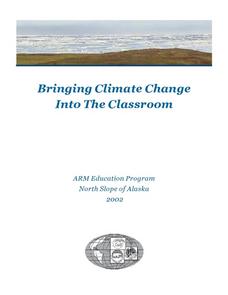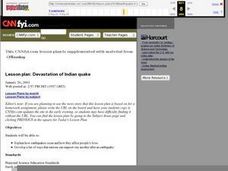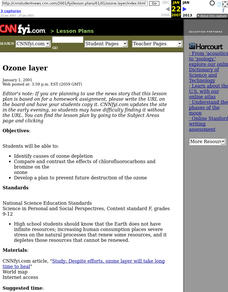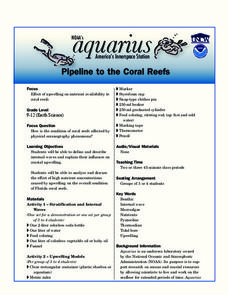University of Colorado
Can Photosynthesis Occur at Saturn?
In the 19th activity of 22, learners determine if distance from a light source affects photosynthesis. Participants capture oxygen in straws and find that the amount of water the gas displaces is proportional to the rate of photosynthesis.
California Academy of Science
Climate Change Impacts
Getting kids thinking about climate change now, will hopefully push them into action when they become adults. Young environmentalists discuss the evidence and causes of climate change seen in the state of California. They brainstorm ways...
Curated OER
Bringing Climate Change Into the Classroom
Students investigate the greenhouse effect and examine the potential effects of climate change in the Arctic. They construct a mini-greenhouse and test its effect on temperature, analyze historical climate statistics, and conduct an...
Curated OER
Radiation Comparison Before and After 9-11
Using the NASA website, class members try to determine if changes could be detected in cloud cover, temperature, and/or radiation measurements due to the lack of contrails that resulted from the halt in air traffic after the attacks...
Curated OER
Devastation of Indian Quake
Students read an online article at CNNfyi.com to determine what happened in India after an earthquake. They determine the magnitude of this earthquake and address the issue of relief efforts from other countries.
NOAA
A Laboratory Simulation of Ocean Surface Currents
Stimulate interest in ocean currents with a simulation. The first installment of a five-part middle school series teaches future oceanographers about the forces that interact to cause ocean currents. A simulation shows how wind and...
Orange County Water Atlas
Location, Location, Location…
Young geographers discover not only how to read and recognize coordinates on a map, but also gain a deeper understanding of latitude and longitude and how climate changes can vary significantly across latitudes.
Curated OER
Ozone Layer
Students read a CNNfyi.com article in order to identify causes of ozone depletion. They compare and contrast the effects of chlorofluorocarbons and bromine on the ozone. They develop a plan to prevent future destruction of the ozone.
Curated OER
Weathering and Erosion
Students examine the similarities and differences between weathering and erosion. They participate in a lab in which they test the effects of different materials when exposed to weathering and erosion. They record their observations.
Curated OER
Weather Dance
Students study weather and focus on specific dance concepts. They are introduced to different ty es of clouds and how they are formed. Next, they study wind and why it occurs.
Florida International University
Pipeline to the Coral Reefs
Discover firsthand the effects of internal waves on coral reefs. Through a series of experiments, learners simulate internal waves and upwelling events as they make observations on the movement of water and other debris. They then...
Florida International University
Design Your Own
Apply scientific principles to designing an experiment to study organisms living on the coral reef in our oceans. Through reading, individuals learn about the coral reef ecosystem and important factors that affect its function....
Curated OER
Weather
Students recognize that carbon dioxide's role in the greenhouse effect. They research the greenhouse effect to design and create a greenhouse structure to measure the changing temperatures over a 24-hour period. In addition, they write a...
Curated OER
Fallout!
Students plot the locations of fallout from two disasters that polluted much of the world's air. They plot the ash fallout from the 1980 Mt. St. Helen's eruption to see what the wind patterns in the United States look like overall. Next...
Curated OER
Seasons and Cloud Cover, Are They Related?
Students use NASA satellite data to correlate cloud cover over Africa to the solar declination.
Curated OER
A Comparison of Land and Water Temperature
Students examine NASA satellite observations of surface temperature and investigate the seasonal changes of land and water temperature.
Curated OER
How Mountains Shape Climate
Students use raw data to make a climatograph; they explain the process of orographic precipitation and the concept of a rain shadow.
Curated OER
Creating Climographs
Students chart statistical information on graphs, interpret the information and use it to explain spatial relationships, and identify the relationship between climate and vegetation.
Curated OER
Industrial Revolution & Climate Change
Young scholars examine the Industrial Revolution and write an essay about the problems it brought to cities. They also examine the environmental impact of the Industrial Revolution. They take a quiz to test for comprehension.
Curated OER
Go To The Head of the Cloud
Students pretend they are water droplets traveling through the water cycle. Using their text, they discover the steps in the cycle and the different paths water can take. They write a report about their journey through the water cycle...
Curated OER
Home-Made Clouds
Fourth graders witness cloud formation in a jar during a teacher lead simulation. They research, draw and predict weather using information they gather about clouds.
Curated OER
An Environmental Puzzle: The Carbon Cycle
Middle school science stars examine fuels and energy with a variety of activities. They begin with a KWL chart, read an informative passage, and then complete a puzzle. The puzzle itself is included. Cleverly, each piece corresponds to a...
Curated OER
"Why Is the Sky Blue?"
Learners investigate why the sky is blue and the sunset is red. They are asked why do you think that we see the sky as blue? Students write a hypothesis on their "Blue Sky Lab Sheet". They explain why they think that the sky is blue...
Curated OER
Ecosystems and Climate
Pupils examine climatic effects on ecosystems. They plant tomatoes and observe the differences in plant growth with differences in light. They create picture collages of plants, animals, and insects found in each climate of the U.S.

























